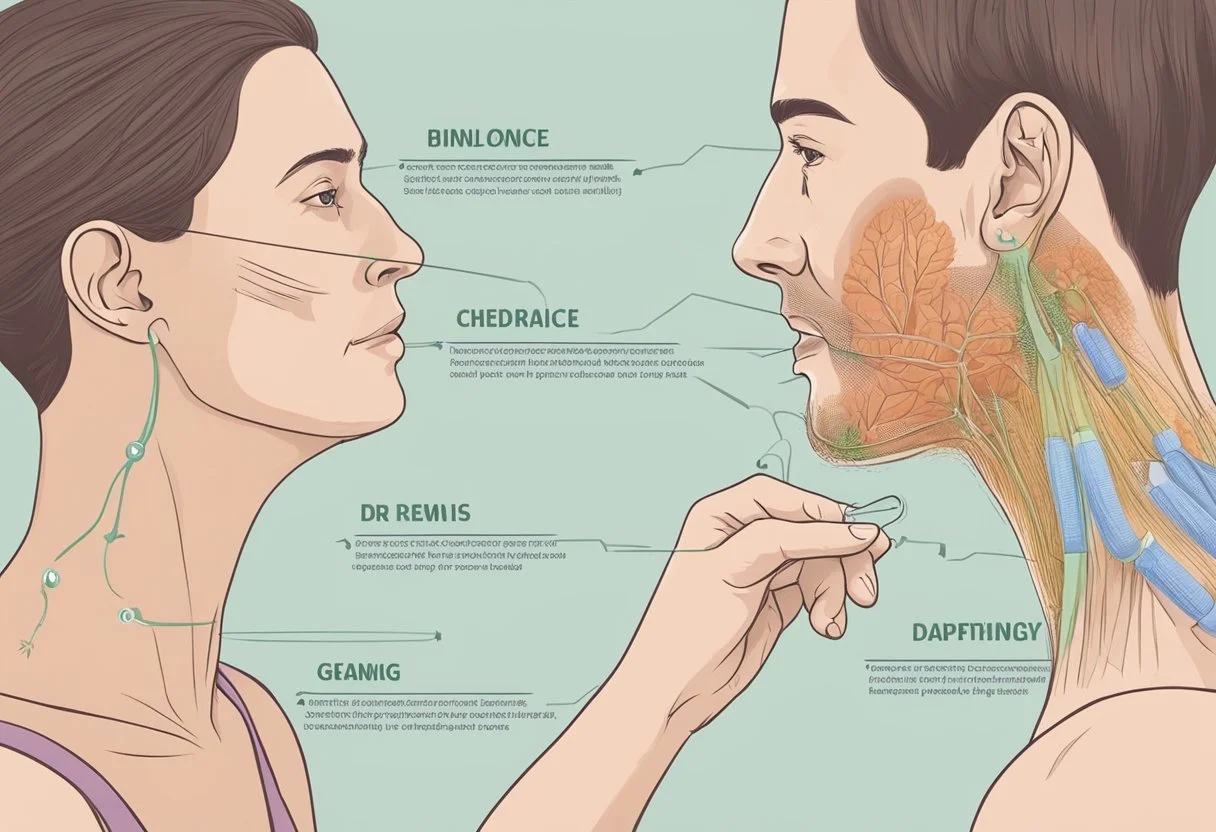Sore Throat
Symptoms, Causes, Home Remedies
Your Comprehensive Guide
Discover > Health Conditions > Sore Throat
A sore throat is a common ailment that affects people of all ages and can cause discomfort and pain while swallowing, talking, or even breathing. Often, sore throats are the first sign of an oncoming cold, flu, or other respiratory infections. However, a sore throat can also be a symptom of other, more serious health conditions. In this article, we will explore the various symptoms and causes of sore throats, as well as provide some home remedies that may bring relief.
Symptoms of a sore throat can vary from person to person, but generally include pain, scratchiness, or irritation in the throat, which may worsen when swallowing or speaking. Other accompanying symptoms might include swollen glands in the neck, hoarseness, dry throat, or redness in the back of the mouth. Identifying the cause of a sore throat is essential for determining the appropriate treatment.
There are many possible causes of a sore throat, including viral infections, bacterial infections, allergens, irritants, and, in some cases, gastroesophageal reflux disease (GERD). While some cases may require medical treatment, many sore throats can be effectively managed with home remedies, such as staying hydrated, using a humidifier, gargling warm salt water, or soothing the throat with medicated lozenges or over-the-counter pain relievers.
Recognizing Sore Throat Symptoms
Identifying Common Symptoms
A sore throat is typically characterized by a scratchy or painful sensation in the throat, often accompanied by difficulty swallowing, a dry cough, and hoarseness. Some of the most common symptoms to look out for are:
Throat pain: A general feeling of discomfort ranging from mild irritation to severe pain.
Difficulty swallowing: Experiencing pain or discomfort when swallowing food or liquids.
Dry cough: A persistent, non-productive cough.
Hoarseness: Changes in the voice, making it sound raspy or strained.
Scratchy sensation: Feeling as if there is something stuck at the back of the throat.
Understanding Severity and Associated Symptoms
The severity of a sore throat can vary greatly and may be accompanied by other symptoms, which can aid in determining the cause of the throat discomfort. Some associated symptoms to consider include:
Fever: A high body temperature (above 100.4°F or 38°C) may indicate an infection.
Swollen glands: Enlarged lymph nodes in the neck could be a sign of an infection or inflammation.
Headache: A headache may be present in conjunction with a sore throat, especially in cases of viral infections.
Body aches: Generalized muscle and body aches can occur with viral or bacterial infections.
Redness: Redness or inflammation of the back of the throat may be visible upon examination.
Differentiating Between Children and Adults
The symptoms of a sore throat often present differently in children and adults. In children, common indicators of a sore throat might include:
Irritability or fussiness
Refusal to eat or drink
Muffled or croaky voice
Drooling or difficulty swallowing saliva
In contrast, adults may experience a wider range of symptoms with varying severity. It is crucial to evaluate the overall symptoms and determine if further medical attention is needed, as certain conditions may require additional treatment to avoid complications.
Identifying Causes of Sore Throat
Sore throats can be caused by various factors, such as viral and bacterial infections, as well as other environmental and lifestyle elements. To help you understand the various causes of sore throats, we have divided them into three main categories: viral infections, bacterial infections, and other factors.
Viral Infections and Their Role
Viral infections are the most common cause of sore throats. Some of the most prevalent viral infections leading to sore throats are:
Influenza (flu): Influenza is a contagious respiratory illness that can cause fever, muscle aches, and sore throat, among other symptoms.
Common cold: The common cold is caused by various viruses, and one of its primary symptoms is a sore throat.
Mononucleosis: Also known as mono or kissing disease, it is caused by the Epstein-Barr virus and often results in a severe sore throat.
Bacterial Infections Impact
Bacterial infections are another common source of sore throats. The most common bacterial infection causing sore throats is Streptococcus pyogenes or Group A Streptococcus, which leads to the condition called strep throat. Other bacteria that can cause sore throats include:
Corynebacterium diphtheriae: This bacteria causes diphtheria, which is characterized by a thick gray coating in the mouth and throat.
Neisseria gonorrhoeae: Gonorrhea is a sexually transmitted infection that can also lead to a sore throat when transmitted through oral sex.
Other Factors Contributing to Sore Throat
In addition to viral and bacterial infections, several other factors can contribute to the development of sore throats:
Allergies: When an individual is allergic to specific substances like pollen, mold, or pet dander, the immune system's reaction can cause a sore throat.
Smoke, chemicals, and pollution: Exposure to smoke, chemicals, or environmental pollutants can irritate the throat, leading to soreness.
Dry air: Low humidity levels or dry indoor air can cause throat irritation and soreness.
Smoking and secondhand smoke: The chemicals present in cigarette smoke are known to cause sore throats, both in smokers and those exposed to secondhand smoke.
In conclusion, understanding the causes of sore throats is essential for proper treatment and prevention. By recognizing the role of viral and bacterial infections and being aware of environmental factors, it is possible to minimize the occurrence of sore throats and their impacts on daily life.
Home Remedies and Self-Care
Natural Remedies and Sore Throat Soothers
There are several natural remedies one can try in order to soothe a sore throat. Honey is a popular choice thanks to its natural antibacterial properties. It can be added to a cup of tea or consumed on its own to help alleviate irritation. In addition to honey, other natural remedies include:
Marshmallow root: Traditionally used to treat sore throats, it contains a mucilage that can help coat and soothe the throat.
Licorice (how long does licorice last?) root: Known for its anti-inflammatory properties, it can help reduce irritation and swelling in the throat.
Slippery elm: Similar to marshmallow root, it contains a gel-like substance that can coat and soothe the throat.
It's important to note that individual reactions to these remedies may vary, and they may not work for everyone.
Hydration and its Importance
Staying hydrated plays a crucial role in treating a sore throat. Drinking plenty of fluids helps to keep the throat moist and reduces the discomfort caused by dryness. Some options to consider are:
Warm liquids: They can help soothe the throat and alleviate pain. Examples include warm water, tea, and clear broth.
Popsicles: These can provide temporary relief from sore throat pain and are especially helpful for kids.
Lozenges: Sucking on lozenges can help stimulate saliva production, keeping the throat moist and easing the discomfort.
Remember to avoid caffeinated and alcoholic beverages, as they can lead to dehydration and make the sore throat worse.
When to Consider Over-the-Counter Options
Sometimes, natural remedies and maintaining proper hydration may not provide enough relief. In these cases, over-the-counter options can be considered:
Gargle - Gargling with warm saltwater can help reduce inflammation and relieve discomfort.
Lozenges - These contain soothing ingredients like menthol, honey, or pectin (how long does pectin last?) to provide additional relief.
Humidifier - Increasing the humidity in the environment can help keep the throat moist and alleviate irritation.
Hard candies - Sucking on them stimulates saliva production and helps moisten the throat. Avoid these for young children due to the risk of choking.
It is essential to follow the usage instructions provided on the packaging of these over-the-counter options and consult with a healthcare professional if the sore throat persists or worsens.
When to See a Doctor
Understanding When Symptoms Are Serious
It's normal to experience sore throat symptoms occasionally. However, there are certain situations when it becomes crucial to consult a doctor for further evaluation and treatment. Seek medical attention if the following symptoms persist:
Fever: A temperature higher than 100.4°F (38°C) lasts more than 48 hours
Swelling: Severe swelling in the throat or neck
Rash: Development of a rash, especially if it's spreading
Difficulty swallowing: Extreme pain or discomfort when attempting to swallow
White patches: Presence of white patches or pus on the tonsils
Additionally, if symptoms worsen or do not improve after a week, it is advisable to consult a doctor.
Possible Complications Requiring Medical Attention
Several serious complications may arise if a sore throat remains untreated, particularly if it's caused by a bacterial infection. Some of these complications include:
Strep throat: A severe throat infection caused by Streptococcus bacteria. It often presents with a sudden severe sore throat and fever, and may require antibiotic treatment.
Swollen glands: Painful and swollen lymph nodes in the neck can indicate an infection that requires medical intervention.
Covid-19: Recent sore throat accompanied by fever, cough, and shortness of breath may warrant testing for the novel coronavirus.
In conclusion, recognizing the severity and duration of symptoms is critical in determining when to see a doctor for a sore throat. Don't hesitate to seek medical attention if experiencing the aforementioned symptoms or complications, as timely consultation and treatment can prevent worsening of the condition and potential long-term effects.
Medical Treatments for Sore Throat
Antibiotics and Their Use in Bacterial Infections
Antibiotics are a common treatment for sore throats caused by bacterial infections, such as strep throat. These medications work by killing or inhibiting the growth of harmful bacteria in the body. Doctors will typically prescribe antibiotics like amoxicillin or penicillin to treat bacterial throat infections. It is essential to take the full course of prescribed antibiotics, even if symptoms improve before the medication is finished, to ensure the complete eradication of the infection.
However, it is crucial to note that antibiotics should not be used to treat viral infections such as the common cold or flu, as they are ineffective against viruses. Using antibiotics unnecessarily can lead to antibiotic resistance, making it more difficult to treat future bacterial infections.
Pain Management and Anti-Inflammatory Medications
Pain relievers and anti-inflammatory medications are often utilized to alleviate throat pain and reduce inflammation during a sore throat, regardless of whether the cause is bacterial or viral. Some common over-the-counter (OTC) medications include:
Ibuprofen: A nonsteroidal anti-inflammatory drug (NSAID) that can help reduce inflammation and alleviate pain. Adults can typically take 200-400 mg every 4-6 hours, as needed.
Acetaminophen: A pain reliever and fever reducer often found in products like Tylenol. Adults can generally take 325-650 mg every 4-6 hours, as needed.
It is important to read the labels of each medication and follow the recommended dosage guidelines. Additionally, consult a healthcare professional before combining medications or if pain persists for an extended period.
Remember that these medical treatments should be used in conjunction with home remedies and self-care to facilitate a smooth recovery and overall throat health.
Prevention Strategies
Preventing Infections and Reducing Risk
One of the most important ways to prevent sore throats is to avoid infections. This can be achieved by practicing good hygiene, which plays a key role in reducing the risk of contracting viral infections such as the flu and the common cold. Here are some practical steps to follow:
Wash hands regularly with soap and water for at least 20 seconds, especially after coughing, sneezing, or touching public surfaces.
Avoid close contact with people who are sick, infected, or showing symptoms of a cold or flu.
Always cover your mouth and nose with a tissue or your elbow when coughing or sneezing. Dispose of tissues in the trash immediately, and then wash your hands.
Do not share personal items such as towels, toothbrushes, or eating utensils with others.
Clean and sanitize frequently-touched surfaces such as door handles, cell phones, and keyboards.
Lifestyle Changes and Environmental Factors
Making certain lifestyle changes and being aware of environmental factors can also help in preventing sore throat. Here are some suggested steps:
Stay hydrated: Dehydration can cause a dry throat which may contribute to soreness. Make sure to drink enough water throughout the day to maintain proper hydration.
Maintain a healthy diet: Eating a well-balanced diet helps strengthen the immune system and reduces the risk of infections.
Get enough sleep: Ensure you get the recommended 7-9 hours of sleep per night, as inadequate sleep weakens the immune system and makes you more susceptible to infections.
Exercise regularly: Moderate physical activity boosts the immune system and can help prevent colds and flu.
Be mindful of air pollution: Exposure to air pollutants can irritate the throat and lead to soreness. Limit outdoor activities on days with high pollution levels and consider using air purifiers at home to improve indoor air quality.
Avoid smoking and secondhand smoke: Tobacco smoke and other irritants can cause inflammation of the throat, increasing the risk of sore throat.
Understanding Related Conditions
Sore Throat in the Context of Other Illnesses
A sore throat can be a standalone condition, or it may be a symptom of other underlying illnesses. One such illness is gastroesophageal reflux disease (GERD), which occurs when stomach acids flow back into the esophagus. This reflux can lead to inflammation and soreness in the throat, and may even damage the vocal cords.
Viral infections are another common cause of sore throat, with conditions such as the common cold and influenza frequently leading to throat discomfort. In these cases, a sore throat is usually accompanied by other symptoms, such as cough, congestion, and fever.
Bacterial infections, particularly those caused by Streptococcus pyogenes, can result in strep throat, a painful and contagious condition. Symptoms may include swollen tonsils, fever, and difficulty swallowing.
Chronic Conditions Affecting the Throat
Sore throats are typically transient and resolve on their own. However, some chronic conditions can cause persistent throat pain.
Tonsillitis: This condition involves inflammation of the tonsils, which can lead to ongoing sore throat, difficulty swallowing, and bad breath. Chronic tonsillitis may require medical treatment or even the removal of the tonsils.
Pharyngitis: Chronic pharyngitis is a persistent inflammation of the pharynx. The condition can be caused by multiple factors, including allergies, GERD, and inhaling irritants such as cigarette smoke.
Cancer: Less commonly, a persistent sore throat can be an early sign of throat or oral cancer. Conditions such as these may present with additional symptoms, including lumps in the throat or neck area, hoarseness, or unexplained weight loss.
Gastroesophageal reflux disease (GERD): As mentioned earlier, GERD can cause chronic sore throat due to the ongoing exposure of the throat to stomach acids. Medical treatment is typically required to manage GERD and its associated symptoms.
In conclusion, understanding the various related conditions that may cause a sore throat can help ensure timely medical treatment and symptom relief.
#most sore throats #sore throat caused #diagnose strep throat #throat culture #viral or bacterial infection #drink warm liquids #trouble breathing #viral infection #dry and painful throat







